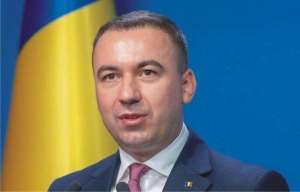The European Union will never allow itself to be blackmailed by anyone, said the European deputy Siegfried Muresan, referring to the negative vote given by Hungary in the European Council in December regarding the review of the multiannual European budget financial framework 2021-2027, a review that also includes the allocation of 50 billion euros over the next four years to support Ukraine.
During a press conference held on Friday in Bucharest, the European Parliament's rapporteur for the EU budget, Siegfried Mureşan, said:
"There are no more reserves in the European Union budget. If something unforeseen happens, we need the revision of the MFF 2021-2027 to allocate money for the reserves and for the new priorities that will emerge. Regarding the review, the allocation of 50 billion euros for Ukraine, for the next four years, as well as the sums necessary for the good control of the external borders, the management of the flow of migrants and the support of the states of the Western Balkans and of southern Europe, is captured. For the support of 50 billion euros allocated to Ukraine, in December 2023, 26 of the 27 member states of the European Union reached an agreement; only Hungary did not give its consent and therefore a new meeting of the European Council at the beginning of February is necessary. If at that meeting Hungary tries to block the revision, I tell you that we will not accept this and that the European Union will immediately adopt the support package for Ukraine through an intergovernmental agreement at the level of the other 26 member states. The European Union will never allow itself to be blackmailed by anyone. This is about plan B regarding the approval of aid for Ukraine, but we want to achieve plan A, that is, an agreement between the 27 member states because in this case the money is allocated from the EU budget, with monitoring by the European Parliament. The intergovernmental agreement only between the 26 member states provides for budgeting at the European level, without the participation of the European Parliament".
Siegfried Mureşan, who is also vice-president of the European People's Party, also referred to the complicated situation triggered by Charles Michel's announcement regarding his resignation from the position of president of the European Council, in order to participate in the elections for the European Parliament where he wants to hold the position of president.
Siegfried Mureşan said: "I consider it unfortunate the announcement of the resignation of Charles Michel from the position of President of the European Council, at this moment when the European Union needs a responsible President to exercise his mandate. In the current case, I remind you that there was a similar situation in 2019 and the European leaders reached an agreement by July 1, 2019 on the EU leadership positions. I expect even now, given the fact that the European elections are between June 6-9, that at the end of June the European Council will reach an agreement on the top positions at the European level. Charles Michel's resignation puts a bit of pressure on the Council, but I expect a deal to come through. I assure you that none of the other 26 member states want an interim presidency of the European Council held by Hungary, which will also hold the presidency of the EU Council from July 1".
• EPP will also claim the position of president of the European Council, if it holds the majority
Asked if the EPP will reclaim this position, the vice-president of the European People's Party stated: "Regarding holding this position of the EPP, the party has held the position of president of the European Commission for 20 years, without interruption; it is natural for the party that wins the European Parliament elections to lead the European Commission; as such, if the EPP wins the elections, I believe that retaining the position of President of the European Commission will be automatic. My assessment is that in the future European Parliament we will have a majority of pro-European parties under the leadership of the EPP. (...) I expect the three big pro-European political parties - EPP, Alliance of Socialists & Democrats and Renew Europe - to form the majority in the future Parliament. (...) The balance of power will perhaps be a little different in the negotiations that will take place following the result of the elections for the presidency of the European Council. At the moment, the EPP holds 12 seats in the European Council out of 27, but a rotation of prime ministers is foreseen in Bulgaria at the beginning of March, when the head of the government in Sofia will be taken over by Deputy Prime Minister Mariya Gabriel, whose party is a member of the EPP , and we will reach 13 members in the Council. Parliamentary elections are being held in Portugal on March 10, where the socialist prime minister's chief of staff was recently caught with a bribe of 80,000 euros in cash in an office. It is clear that the EPP will have at least 13 members in the European Council in June, maybe even 14, i.e. at the limit of the majority, and under these conditions it will be difficult to understand for the EPP to cede the position of President of the Council to the representative of another party. These are the numbers, this is the objective analysis, the rest is speculation in which I do not want to participate".
Related to the information coming from Brussels regarding the consideration of President Klaus Iohannis for taking over the position of President of the European Council following the resignation of Charles Michel, Mr. Siegfried Mureşan stated: "We already know that at the European level the President enjoys confidence, enjoy appreciation. I'm not the only one saying it. Even the former president of the European Council, Donald Tusk, said it publicly, as if in Bucharest, during an event in 2019, considering him suitable for this position. I will help any approach that is a political winner, but the decisions will be made after the European elections, in the light of the results, depending on the weight of the parties at that time".
• EPP will determine in Bucharest the candidate for the position of president of the European Commission
The Vice-President of the EPP also spoke about the accession negotiations of the Republic of Moldova to the European Union, which in his opinion would be "ideal" to start before the European Parliament elections, because after the election the European legislature will be in a short process of reorganization, which which will make the actual launch of negotiations more difficult. He showed that European Commission officials are preparing the framework for the start of negotiations, but a unanimous decision of the European Council is needed to approve it; only in the next stage will the negotiations be opened through an intergovernmental conference between the authorities of the Republic of Moldova and the European Commission. At the same time, Siegfried Mureşan specified that until then it is important that our country completes the implementation of the three outstanding elements from the European Commission's recommendations.
Mr. Mureşan said: "It would be ideal for the negotiations to start before the European Parliament elections, because after that, in the second part of the year, on a technical level, the representatives of the European Commission and the authorities of the Republic of Moldova should negotiate. We know that the Russian Federation tried by all means to prevent this positive decision of the European Union, both with regard to the Republic of Moldova and with regard to Ukraine. Thus, the Russian Federation failed. We have a confirmation of the fact that the Republic of Moldova managed to leave the sphere of influence of the Russian Federation. In the last 2 years, the pace of reforms has been higher than ever, reforms that have been blocked for years, such as in the field of justice, in the fight against corruption and money laundering".
We remind you that, on December 14, the European Council decided to launch the accession negotiations of the Republic of Moldova to the European Union.
The EPP leader also referred to the organization of the European People's Congress in Bucharest at the beginning of March. Siegfried Mureşan specified that then the political program will be approved, the PNL will launch its list of candidates for the European Parliament, and the EPP will determine, according to the state, its candidate for the position of president of the European Commission. In the opinion of Mr. Mureşan, if Ursula von der Leyen will express her option to run for a new mandate, then the EPP will support her for the continuation of her activity as president of the European Commission in the next 5 years.
The European Parliament elections will take place in the European Union states between June 6-9, 2024, previously announced the head of the European Legislature, Roberta Metsola. The European Parliament is made up of 705 deputies elected in the 27 member states of the European Union, by direct universal suffrage for a period of five years.
















































